

Living peace
congregation of the sisters of st. joseph of peace

in this issue
peace
mission of Living Peace, a free occasional publication of the Congregation of the Sisters of St. Joseph of Peace, is to build community with a diverse audience by engaging our readers in contemplation and action for justice and peace through informative and reflective articles, poetry and prayers.
If you wish to change your address, or if you or someone you know would like to be added to our Living Peace mailing list, please contact Cristina Turino at cturino@csjp.org or 201-608-5401.
Copyright: Articles in Living Peace may be reprinted. Please include the following on reprints: “Reprinted with permission from the Sisters of St. Joseph of Peace, 399 Hudson Terrace, Englewood Cliffs, NJ 07632, www.csjp.org” Please send us a copy of the reprinted article.
Jan Linley, Editor
Susan Francois, CSJP, Leadership Team Liaison Cristina Turino, Editorial Assistant and Distribution Manager
Cover Art: by Sister Julie Codd, CSJP
Sr. Julie’s artistic vision is deeply rooted in the charism of the Sisters of St. Joseph of Peace, which calls for peace, justice, and care for creation. Her work embodies the Congregation’s mission by creating spaces for reflection, fostering connection with the Divine, and inviting us to contemplate how art can be a path toward a more peaceful world. Through her creative expressions, Sr. Julie continues to live out this charism in ways that inspire others to see beauty and peace in every corner of life. You can find more of her work here: https://peaceandspirituality.csjp.org/theartofpeace
Design
Beth Ponticello, CEDC, www.cedc.org
We Are Called to Be People of Peace
by Susan Rose Francois, CSJP
We are followers of the Word of God, Jesus, Christ our Peace.
As we proclaim in our CSJP Constitutions: “United with him we engage in the struggle against the reality of evil and continue the work of establishing God’s reign of justice and peace.” (Constitution 2) This is our call, in this time and place, no more and no less. We are called to be people of peace who seek justice for God’s people in need and all creation, in unity with the Word of God. Indeed, as we challenged ourselves in the Call of our most recent Congregation Chapter: “It is time to live our words.”
Our founder Mother Francis Clare (Margaret Anna Cusack, pictured) knew the power of words. In her original 1884 Constitutions, she named as one of our special objects the circulation of good books. She also published our first periodical in 1886, The Dove of Ireland. Throughout our entire history, the Congregation has used the written word to inspire work for peace through justice. The Dove was renamed The Orphans’ Messenger and Working Girls Friend, then the Orphan’s Messenger and Advocate of the Blind (1899), and finally in 1977 St. Joseph’s Messenger and Advocate of the Blind. Living Peace and our book publishing imprint, Kenmare Press, continue this tradition.
message of Jesus given at the Sermon on the Mount in light of contemporary realities in her time.
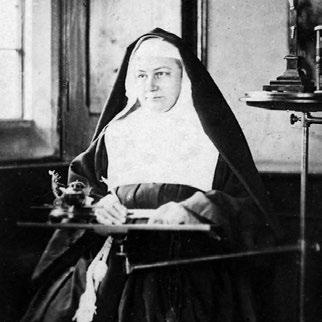
We do the same every six years when we write our Chapter Call. In many ways, the situation today is not that different from what Mother Clare named in 1874. The Call of our twenty-third Congregation Chapter names our contemporary deathdealing realities of racism, war and violence, forced migration, political polarization, and environmental destruction. The world it seems has still not learned the sublime lessons of the Word of God. Our capacity to cause harm has only increased, as has the scale of the negative impact. It is enough to make one weary. Yet we are not one. We are not alone in this struggle against the reality of evil. We are a community of sisters, associates, partners in mission, and friends. We are inspired and strengthened by our Creator God who loved us into being, the Word of God who is our peace, and the ever-present Holy Spirit the giver of life. We are called to live our words together, “urged by a burning desire to speak and act boldly with open, loving, and adventurous hearts and in collaboration with others”
(Call of the 23rd Chapter).
Mother Clare’s words from the Book of Blessed Ones encourage us on this journey.
Words help us to name what we see when we read the signs of the times.
“The nations are involved in misery, their countries are desolated, their families are ruined, their blood is poured forth on every side. And why? Because the teachings of the All-merciful are condemned, are neglected, are forgotten, and men who have boasted of their advancement in science are at fault, are unable to maintain the common rights of man, because they have not cared to learn the sublime lessons of political economy taught them by the Creator and Savior of the world.”
Mother Clare wrote these words in her 1874 Book of the Blessed Ones, in which she reflected on the
“Let us begin to-day, let us begin now. We may expect many failures, we shall meet many difficulties; but our failures will not become less by waiting nor our difficulties less by delay. Let us also have courage and persevere.”
Amen.
“In the beginning was the Word, and the Word was with God, and the Word was God.” (John 1:1)
FROM THE EDITOR
Standing with the Forces for Good
by Jan Linley
If someone with a crystal ball had told me in the mid-nineties, when I was first hired by the Sisters of St. Joseph of Peace, that I would still be working here in 2025, I would have told them they needed a new crystal ball! Little did I know what I was walking into back then. As a non-Catholic, my notion of Catholic nuns was both inaccurate and stereotypical, and when I balked at the opportunity to interview with them thinking it was not a fit, I was told by the employment agency that these were some very progressive, savvy women doing amazing things.
Now here we are twenty-five-plus years later. So, why did I stay so long? It turns out the employment agency wasn’t wrong. I always come back to the fact that not only do the sisters and associates walk their talk, but they also keep examining their words and commitments and calling themselves to go deeper and stretch wider in their understanding of and responses to the complex, intertwined needs of our wounded world. As they’ve aged and grown smaller in number, they have continuously sought creative ways to be active peace through justice advocates and offer beacons of hope where hope is in short supply.
are several committees in the Congregation devoted to both the stewardship of these resources and the responsible sharing of them. Melody Maravillas provides a window into that ministry calling for hope and love to rule the world through whatever means we can make that so.
Michael and Brett Hayes, our Fresh Voices profile this issue, could teach us all something about love and hope ruling our world. They have built a beautiful, blended family on just that.
David Richardson takes us on a 10-year tour of Pope Francis’ encyclical Laudato Si’: On Care for Our Common Home, which has prompted environmental changes in the United Kingdom and around the world. The Sisters of St. Joseph of Peace, along with many other congregations and groups, have committed themselves to the Laudato Si’ Action Platform. You can read more about it on our website. Ranging in age from 25 to 125, the Congregation’s sponsored ministries in New Jersey, now under the helm of Peace Ministries, were born of the needs of the times.

As Sister Susan Francois points out in her Message from Leadership, this Congregation was built on the power of words. The founder, Mother Clare (Margaret Anna Cusack), was a prolific writer, publishing 40 books in her lifetime as well as periodicals. These publications and current publications, including Living Peace, have always served to build community and collaboration through engagement.
In these unprecedented times, the sisters and associates know complacency is not an option. Both Marselys Lucero and Sister Teresa Maya, CCVI, make the strong case that, now more than ever, we need to show up in whatever way we can to live our words, be who we say we are. Prayer and presence matter and so does inspired action. The Sisters of St. Joseph of Peace share their resources, positively impacting the lives of not only people but our environment. There
Kelly Marsicano invited the leadership of these ministries to tell us how they remain responsive to today’s needs.
Meanwhile, Stephanie Peirolo presents us with a call and challenge to pay attention to our choices. She writes, “C.S. Lewis often reminds us that we are eternal beings, and that small choices now can have long term consequences when you extend the trajectory throughout eternity.”
Speaking of choices… there are many reasons I have stayed with the Sisters of St. Joseph of Peace. There is never a dull moment in an organization that is constantly reading and responding to the signs of the times and is dedicated to examination of conscience. It feels good to support women and men who are working for peace through justice, who are standing for love and hope, especially when our beloved planet, our rights, freedom, and even dignity are being threatened. I don’t need a crystal ball to know that I am going to keep choosing to stand with the forces for good. Anything less is unconscionable.
MEET AN ASSOCIATE
Blessed Then, Now and Forever
by Reverend Dale Kelley, CSJP-A
I have been blessed to be an associate of the Sisters of St. Joseph of Peace for over 35 years, and the time has just flown by. It all started when Sister Kathleen Pruitt and I met in an effort to create a Seattle Crop Walk for the Seattle Council of Churches. The purpose of the event was to raise money to alleviate hunger in various parts of the world. Our initial conversation quickly led to Sister Kathleen inviting me to become an associate with the CSJPs. The walk event never materialized due to complications, but the associate membership flourished.
A year after becoming an associate, I graduated from Northwest Theological Union at Seattle University with a master’s degree in divinity. I invited our CSJP Provincial Team (Sisters Andrea Nenzel, Kathleen Pruitt, Carmel Little, and Charlotte Davenport) to be a central part of my ordination service into the Christian church (Disciples of Christ). True ecumenism, or oneness within the Body on Christ, has always been a dream of mine, as well as of my denomination… which is one reason that we were all so thrilled to have the sisters as part of the ordination ceremony!
Through my ministry years — and my life as a whole — the CSJP charism of peace through justice has been my focus and motivation. It was a great privilege to travel with Sister Andrea and several others to El Salvador, during the civil war years there, and to Haiti to deliver medicines to the several villages.
During my 18 years of ministry in Alaska, I was privileged to serve churches that had sister relationships with Native villages, which enabled me to visit and minister with them as well. Those years included living and working for two years out in the Aleutians on Unalaska Island at Dutch Harbor. This was a great experience with the Aleut people as well as fishermen you may have learned about on the television show Deadliest Catch!
I retired and moved back to Washington State in 2011 to the Olympic Peninsula, but I still fill in occasionally for pastors who are ill or on vacation. This work helps keep me grounded in the people of God.
I have found that my more remote home on the Peninsula and my age make the trip to Bellevue more challenging than when I was younger. So, at 83 years old, I find that I don’t make it to as many gatherings there as I would love to attend. Our newly formed online CSJP Faith Sharing Group, the Diaspora, has become a true gift as we can now be in touch, regardless of where we live or how able we are to gather. I look forward to even more livestream and Zoom opportunities to continue being present with sisters and associates.
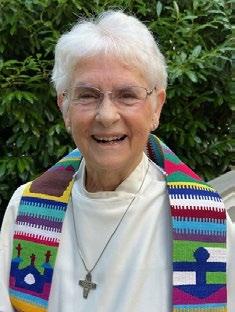
There have been many blessings in my life including my two adult daughters, Jennifer and Stephanie, and my life partner Joan. And being invited into my associate membership with the precious Sisters of St. Joseph of Peace continues to be one that has indelibly impacted my life then, now and forever!
WHO ARE ASSOCIATES?
Associates of the Sisters of St. Joseph of Peace are individuals who live out the spirit and mission of the CSJPs in their daily lives. They commit to an ongoing mutual relationship with the sisters, other associates, and the charism of peace through justice. They do this in family life, in the Church, and in society. Associates “strive to respect the dignity of all persons, to value the gifts of creation and to confront oppressive situations” and to “promote social justice as a way to peace.” (from Constitution 11) Visit csjp.org/join-us to learn more.
An Invitation to Act with Compassion
by Marselys Lucero, Congregation Peace through Justice Director
During my first five months in this position, I’ve immersed myself in learning about acting upon and protesting unjust immigration policies. Like many people of goodwill and heavy conscience, I find myself angrily contemplating the pain inflicted upon migrants through government policies. What is beginning to trouble me more is how ideologies of nationalism, nativism, isolationism, and authoritarianism have gained traction in both the United States and the United Kingdom. It can feel like there is very little compassion in considering the experiences of migrants.

The reasons why a person might leave their home country can include seeking asylum from dangerous climate events or escaping extreme poverty or political instability. Hebrew scripture recognizes these circumstances and the difficulty that migrants might feel in a new place. In Leviticus 19:33-34, God commands the Israelites to “treat the alien who resides with you no differently than the natives born among you; have the same love for him as for yourself; for you too were once aliens in the land of Egypt.” God understands that migration for survival is not easy and that the Israelites should encounter strangers with compassion, especially given their experience in foreign lands.
The policies in the U.S. surrounding migrants have been unjust and have harmed countless families. Three years into the COVID pandemic, Title 421 was put into place, essentially halting all migration, including asylum seeking along the southern U.S.Mexico border. Even those with legitimate asylum
claims could not apply for refuge in the U.S. Today, there are more than 49,000 people held in detention across the country.2 Despite President Donald Trump’s proclamation stating that migrants who have committed crimes would be prioritized in detention and deportation efforts, almost half of the people in detention have no criminal record.3 Many of these people were asked to meet with Immigrations and Customs Enforcement for a Green Card interview or to renew their work permits, or were simply students who expressed their political opinion when they were arrested and detained, or deported. Instead of treating the stranger like part of our community, ensuring rights granted by the Constitution, the U.S. government has made it a priority to use migrants to bolster political capital or use as scapegoats. Many people have already sacrificed so much, like isolating themselves for a better economic opportunity, sending wages back to their families in their home countries, or crossing deadly terrain for the chance of stability and security in the U.S. The policies that ignore these sacrifices and refuse to view migrants as people defy the commandment to hold compassion for people around us.
Similarly, migrants attempting to enter the United Kingdom are meeting a shift in policy and tone when it comes to immigration. Though Labour now governs, right-wing factions (that are positioning themselves for stronger political influence in the next decade) continue advocating for deporting migrants to Rwanda as a deterrent, regardless of their origin. Still, Prime Minister Keir Starmer and the Labour
© “Christ of Maryknoll” by Br. Robert Lentz, OFM, Courtesy of Trinity Stores, trinitystores.com. Lentz says this image helps us “to see the Christ among the least of us, and to serve the Christ that lives in the margins of this world.”
“At this moment when our governments are urging the rest of our countries to treat the migrant as a stranger, we must continue to advocate for the dignity and rights of people who arrive in our communities.”
party are planning policies that are cracking down on unauthorized immigration as well as greatly limiting legal immigration in the form of visas. On May 13, 2025, in a national address, Starmer stated that the U.K. risks becoming “an island of strangers” without limiting immigration. This language identifies migrants as a source of dilution and a loss of identity in the U.K., further highlighting the move toward antimigrant sentiments for even left leaning governments and illustrates this growing sense that immigrants are people to fear instead of people who desire to collaborate in society. Similar to Trump’s decision to deport people to a third country to be held in foreign detention, on May 15, Starmer proposed using foreign detention for asylum seekers who had exhausted the appeal process.4 These reactive policy ideas and actions point to a lack of compassion and creativity when it comes to confronting and addressing immigration. Two of the world’s leading economic powers making these kinds of decisions makes the future of immigration all the more worrisome as the earth deals with climate change and the effect on human communities.
Since the beginning of this Congregation’s founding, the care for the poor and vulnerable, especially the migrant, has been paramount. Since 1884, sisters and associates have engaged in pastoral work for migrants and will continue to do so. At this moment when our governments are urging the rest of our countries to treat the migrant as a stranger, we must continue to advocate for the dignity and rights of people who arrive in our communities. Over the last few months, our Congregation has participated in protests and demonstrations. We must continue to lend our presence and our voice to advocate on behalf of migrants. We should continue to pay attention to local and state legislation that secures immigrant rights to resources like healthcare. Washington state just passed three laws aimed at protecting immigrant rights, and New Jersey is in a similar process in its state legislature. Plan a regular call or visit to your legislator to advocate for just
decisions in national laws. Support organizations that are partners in the work of care and advocacy. If you need any suggestions, NewsNotes, which you can find on our website, is a good place to start. While scripture can be difficult to incorporate into our daily practices and devotions, God’s commandment to love the stranger is an invitation to action that both pleases God and honors the experiences of our neighbors.
ENDNOTES
1 National Immigration Forum, “Title 42 FAQS,” Accessed May 16, 2025. https://bit.ly/43Y9vHr
2 Tracreports.org, Accessed May 16, 2025. https://bit.ly/4l3sc1K.
3 “Trump claims on immigration Enforcement: Rhetoric vs Reality”, Tracreports.org, Accessed May 16, 2025. https://bit.ly/40cmd2H.
4 Adu, Aletha, Rajeev Syal, and Peter Walker. “Starmer Reveals Plans to Send Refused Asylum Seekers to Overseas ‘Return Hubs.’” The Guardian, Accessed on May 15, 2025. https://bit.ly/4kFg0Ve.
Response to Current Events
Current responses to pressing justice issues can be found at www.csjp.org under the Justice tab, including the Congregation’s statements, such as their recent one on civil unrest.
In addition to the monthly electronic publication NewsNotes, there is a bi-weekly peace through justice newsletter addressing the fast-moving news, legislation, and organizing that is taking place across the three regions where sisters and associates live and work. We invite you to become a subscriber to both the bi-weekly and monthly versions of NewsNotes
When Hope and Love Should Rule Our World
by Melody Maravillas, Congregation Chief Financial Officer
During a museum trip, I chanced upon a lithograph by George Biddle. Fire appears to rain down on a perverted world, where greens and blues depict decay instead of life. The scene is so irrational that it is difficult to make any sense of it. A woman sits on top of a braying donkey as Father Time is goaded on by a pig riding on his back. Predatory dinosaur skeletons loom over an emaciated white horseman struggling to spread light amid the chaos. People cower underground in fear, some of whom have died waiting for a savior. The art evokes confusion and despair. Biddle’s work is titled Si Regnent Saeculum Nostrum Ignorantia Timor Odiumque (If Ignorance, Fear, and Hate Should Rule Our World).
What would our world look like if we flipped the script?
In his message for the 2025 World Day of Peace, Pope Francis said, “Hope overflows in generosity; it is free of calculation, makes no hidden demands, is unconcerned with gain, but aims at one thing alone: to raise up those who have fallen, to heal hearts that are
broken and to set us free from every kind of bondage.” Building the world we want begins with hope. With hope, our hearts open to inspiration that leads to action. Such an inspiration arrived during a gathering organized by Francesco Collaborative for faithbased investors. For two days, we were immersed in prayer, discourse, and even dreaming. What change is possible when our finances reflect our faith? I found myself in a conversation about the Jubilee year and Pope Francis’ appeal, once more, to cancel the debt of developing nations. Freedom from debt addresses global inequities and restores balance. With autonomy over their finances, developing countries have the opportunity to invest in their societies and improve their condition. Doesn’t the Pope’s call apply to us as well?
In the spirit of the Jubilee, CSJP’s Impact Investing Committee selected to forgive its oldest investment, a loan made to Mercy Community Capital (MCC) almost 30 years ago. MCC provides low-cost capital for projects that
strengthen communities. Their affordable housing developments benefit low-income families, seniors, farm workers, and people with special needs. Forgiving this loan releases the funds for other good works of MCC. In their acknowledgment, Stefanie Joy (President of MCC) wrote, “Your donation will allow Mercy Community Capital to continue to work to create a more humane world where poverty is alleviated, communities are healthy, and all people can develop their full potential.”
The wonderful thing about hope is that you don’t need much. All you need is a glimmer, a sliver, or a spark to make an impact that spreads to others.
For many of our dialogues with large corporations, we own less than 0.1% of their outstanding stock. With that small opening, we can engage in their human rights and environmental policies. We educate and advocate, pointing out areas in their operation that might be perpetuating harm to the earth, children, indigenous people, and other vulnerable communities. Despite our current
“The wonderful thing about hope is that you don’t need much. All you need is a glimmer, a sliver, or a spark to make an impact that spreads to others.”

“...hope is not an evasion, but a challenge; it does not delude, but empowers us.”
societal challenges, there are corporations that are willing to implement change. We use these small wins to encourage others to follow suit.
The charities we support are remarkable at stretching a dollar or pound. Several grants made by CSJP have funded programs that tap into the healing power of music. The Hope Bridge program by Collateral Repair Project has helped youth refugees in Jordan recover from trauma and find means of expression. Another program by Africa Faith and Justice Network produced a multilingual song that is being used to spread peace and unity
among the diverse ethnic groups in Congo.
In his final Easter message, Pope Francis urged us to continue to hope, “That hope is not an evasion, but a challenge; it does not delude, but empowers us.” When we allow ourselves to envision a life-giving world, we can take steps to get there. In such a world, we celebrate each other’s differences. Children grow up healthy and enjoy the presence of their elders. Families are able to remain in the lands where their ancestors dwelled. Creation thrives. This is what I imagine when Love should rule our world.
VIDEO: Song Tuishi Pamoja by All Stars Inter Communautaires
VIDEO: Hope Bridge: Empowering Refugee Families to Heal and Build Harmony
SCAN TO WATCH
Music Artists for Peace in studio to record ‘Tuishi Pamoja’ (Swahili for ‘we want to live together’) song track. Photo used with permission by Africa Faith and Justice Network.

Fresh Voices Blood Only Makes You Related, Love and Trust Make You Family
By Michael and Brett Hayes
Most of the articles in Living Peace are written by sisters, associates, or staff. Fresh Voices is a column written by, or focusing on, someone outside the CSJP community to help raise awareness on specific issues.
In a world where so many are hurting and in need of love, Michael and Brett Hayes have chosen to expand their capacity to love through fostering and adoption, compassionately creating a family and a safe and loving home for three boys. We reached out to them recently to learn more about how they chose to take this road less traveled.
When and how did you two meet?
Brett and I met back in August of 2009. He was visiting for Gay Pride Amsterdam, and we were introduced by a mutual friend. We hit it off, but he was only there for the weekend. Two weeks later he came back to visit me
and after that visit we decided to start dating and give a longdistance relationship a shot. We did long distance for a couple of years, mainly because of many immigration challenges here in the USA, so Brett decided to move to the Netherlands in 2013. After two years there, we made a mutual decision to move to the USA, so we packed up and we’ve been back since 2015.
When did you decide you wanted to have kids?
I have always known I wanted to be a dad. I guess it’s in my blood. Brett, on the other hand, not so much. He never really had a desire for kids. But then after our nephew was born and he started
Ethan, Jayden, Brett and Damon
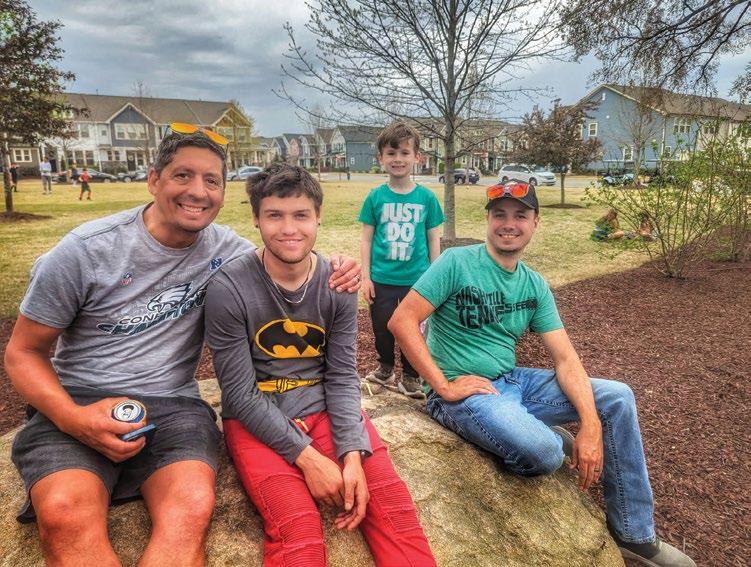
to get older, that little munchkin started opening Brett’s heart, and eventually he came around and we started planning how we wanted to start a family.
Why did you choose to foster and ultimately adopt?
Our goal was always to start and grow our family, but certain options can also be very expensive. Until doing research, we didn’t realize how many kids are in foster care and how many of those kids need a forever home.
It spoke to us, so we decided to get licensed. The main goal for foster kids is always reunification with their biological parents; however, that doesn’t always work out, so we decided to focus on the children that were free for adoption.
How old were your sons when you fostered/adopted each of them?
For each child we have taken in, it has taken about a year from the day they moved in until the adoption was final. In that period, we were technically fostering them. Our first one was Damon. He was 17 when he moved in, but his 18th birthday was right around the
corner. Damon’s adoption probably took the longest, because Damon has special needs. The combo of that and technically being an adult made it a difficult adoption case. His adoption was final right after his 19th birthday!
A couple of months after Damon’s adoption, Ethan moved in. He was 15 when he moved in. Ethan’s adoption was final in about nine months, right before his birthday, which funny enough is the same birthday as Damon. Talk about meant to be.
Recently, about a month ago, our third and final son moved in. Jayden is eight, and he’s just another perfect fit. His adoption will be final later this year.
Have you faced discrimination or had any special challenges?
It’s hard to prove, but we have definitely felt that we weren’t picked for kids that we showed interest in because we were a same-sex couple. Every county has its own Department of Special Services (DSS) and even within that same DSS office, every social worker works differently and seems to have different rules and their own set of beliefs. The kids don’t seem to be phased at all.
They just want to be loved. Outside of that we haven’t really run into weird situations, but we also make sure we live in a mostly blue area, so the chances of our kids getting exposed to hate are small.
What advice might you give to someone else who wants to start a family this way?
Find people who are on a similar path and that understand parenting kids with trauma is different. Your “normal” village simply won’t understand, even though they have really good intentions. Find a Facebook group for foster families in your area. You would be surprised how many people are on the same journey.
What are your hopes for your family for the future? Our hope is that their biggest struggles are already in the past, and that they can finally breathe, get out of survival mode and live a happy and healthy life.
What gives you the most joy about your family?
It’s really the small things. Watching our kids daily playing together and acting like real brothers or a random hug and an “I love you” from one of the kids. Blood only makes you related, love and trust make you family.
In recognizing the dignity of all persons, we commit ourselves to education and action that aim to eliminate discrimination in all its forms within the congregation, in those places and institutions where we minister, and in the wider society.
(Constitution 24)
Brett, Damon, Jayden and Michael
CSJP Charism, Gift, & Spirit! An open letter of gratitude to the CSJP family
By Teresa Maya, CCVI
“Charism is a gift of the Spirit.” A statement we have been tossing around in charismatic families for several decades, familiar, matter-of-fact even; and yet, we need to engage with its three components in light of the times we are living through. What is charism? How do we know it’s working? How do we know it’s healthy or waning? And for apostolic congregations, with a culture of service and giving, “gift” can be challenging. We are not used to being on the receiving end; we like to do, create, offer, and make possible. And then, the Spirit, the third person of the Trinity… present, inspiring, consoling, and often noticed only in retrospect.
Times of uncertainty demand a clear sense of identity. They challenge us to answer questions we tend to postpone until we tend to the urgencies: Who are we? Why are we here? What is ours to do? What are our values? Charism is the soul of an institute. Charism is at the heart of the CJSP identity. Charism is the reason sisters committed their lives to the Reign of God in this institute, the reason friends and benefactors collaborate in the Mission, the reason for the ministries, the litmus test for our discernment. How do we know we are stewarding the charism? I offer some insights to kindle the conversation: charism needs a healthy ecosystem, a community of relationships. The stronger and healthier the relationships between sisters, associates, lay collaborators in ministry, friends, the more energized the charism will be. The charism energy will then spark possibility in the style of the CSJP family. And what is that style? Perhaps it takes outsiders to notice more clearly.
I have accompanied the CSJPs for several years, as speaker and friend, and I have noticed three traits of the charism that I pray you continue to shine on our hurting world: community, justice-advocacy, and openness to what is emerging. CSJP is a community-building, hospitable space for our world. At your best, you make everyone feel welcome, even if the differences can be awkward or the diversity needs to be reconciled over and over again. Your very soul is a place of welcome. Whether in small ways like offering baked goods at St. Mary’s in Bellevue, or morning tea in the U.K. Or, more significantly, hosting events in your congregational centers. Your relationships are growing in the digital world, and you always offer digital content that builds bridges and promotes human dignity. You are justice advocates; you are a voice for justice! When others are timid or afraid to stand up for those in vulnerable situations, your voice is always among the first; the Gospel is your message, whether in or out of fashion. Your presence in marches, your digital footprint, the use of your influence, and the advocacy through your resources are beacons of hope for communities worldwide. And then, there is that openness! CSJPs have always been early adopters, unafraid to test a new idea, process, or structure. Your journey to one has been admirable, despite the many time zones it spans; you have merged structures and resources, but more importantly, you have created a culture of unity. Pope Leo will be proud.
“Times of uncertainty demand a clear sense of identity.”
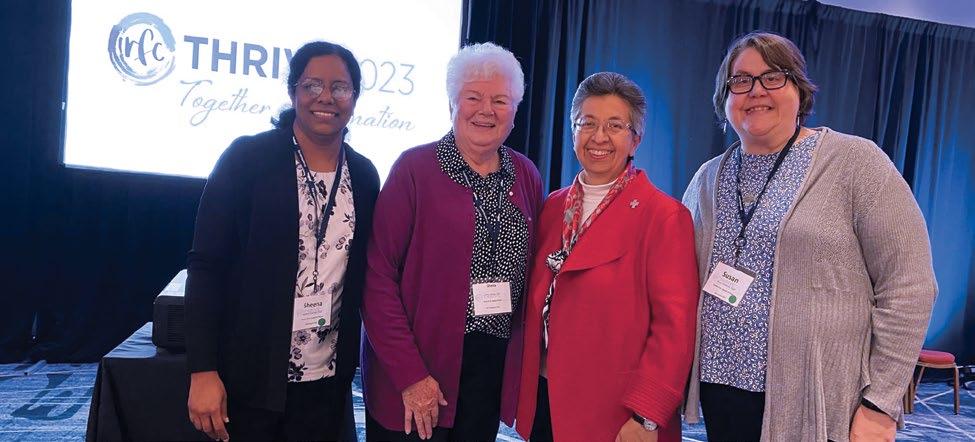
The challenge for CSJP now is gift. Because gift requires patience, waiting, and above all faith. And here is where the “Peace” in your name becomes your spiritual legacy. You might be St. Joseph people, but with a Peace last name. Pope Leo referred to the Resurrection Peace when he stood on the balcony for the first time after his election. He greeted our Church with the words of the Resurrected Christ: “Peace.” I realized this gift has come into my life through your witness. A gift that can be freely given because it is freely received, active peace and spiritual peace. We are normalizing violence. I have watched it grow in Latin America and spread through our continent. Violence is now seeping into our relationships, families, and ministries. COVID kindled a violence in the form of fragmentation and dehumanization that desperately needs the gift of peace. Welcome the gift of peace into your midst. Teach us how to be peace for our world, please.
Finally, how can the CSJP family fine-tune its dialogue with the Holy Spirit? I write these words in anticipation of Pentecost. That moment turned fear into hope, difference into relationship, and doubt into faith. That moment when a community gathered gets inspired into apostolic commitment to create the world God dreams for all of us, to do our part to build the Reign of God. We are now all challenged to be synodal missionaries, to move the Church and the world into the synodal ecclesiology where authentic listening is the reason all feel welcome. Human agency alone will not accomplish this, so it is time to renew our trust and faith in the Holy Spirit. What and how do we believe in the Holy Spirit?
I pray the Holy Spirit reaches through every crevice of the CSJP family and ignites your charism to bless our world. Margaret Anna Cusack is dreaming that for you, I am sure.
“We are normalizing violence. I have watched it grow in Latin America and spread through our continent. Violence is now seeping into our relationships, families, and ministries. COVID kindled a violence in the form of fragmentation and dehumanization that desperately needs the gift of peace.”
L to R:
Sisters Sheena George, Sheila Lemieux, Teresa Maya and Susan Francois
pause

Peace is God’s gift to us, given in Christ, a gift we experience and enjoy now, though not in its completeness.
We believe that peace points beyond itself in hope to the fullness of time.
(Constitution 1)
A Living Sign
by Bonnie B. Belasic
I know not always how God comes, but that God comes—this I know: in an obscure stable, in splashing waters, in the breaking of bread and often, my friend, incarnate in you, for God, I believe, still comes in the flesh, in people. Now and always may the Christ in you keep you a sign of living love and love living among us.
While the energy of our thoughts, speech, and actions is powerful, this energy is infinitely more powerful when we join together with others. When we come together as a group, with a common purpose and commitment to mindful action, we produce an energy of collective concentration far superior to our own individual concentration. This energy further helps us to cultivate compassion and understanding. - Thich Nhat Hanh, Love Letter to the Earth
Eternal God, you made us in your own image, and became one of us in Jesus Christ. Look with compassion on the whole human family; Take away the arrogance and hatred that infect our hearts; Break down the walls that separate us; Unite us in bonds of love; and, through our struggle and confusion, Work to accomplish your purposes on earth; So that, in your good time, we learn to live as brothers and sisters, to serve and love in harmony. Amen.
Adapted from “A Litany for Healing” by Rev. Adam Thomas

The longer I live, the more deeply I learn that love— whether we call it friendship or family or romance—is the work of mirroring and magnifying each other’s light. — James Baldwin, Nothing Personal
A Prayer to the Holy Spirit
Come spirit of God, grant us the power to be gentle, the strength to be forgiving, the patience to be understanding, the endurance to accept the consequences of holding on to what is right.
Come Spirit of God, help us to put our trust in the power of good to overcome evil, the power of love to overcome hatred.
– Pax Christi USA, as printed in Good News from the Missions Office, Seattle Archdiocese
Special thanks to Sister Carmel Little, CSJP, for her preparation of the Weekly Peace Prayer, which can be found on the CSJP website under the Spirituality tab.
Caring for Our Common Home: A Decade of Change in the UK
By David Richardson, Peace through Justice Worker
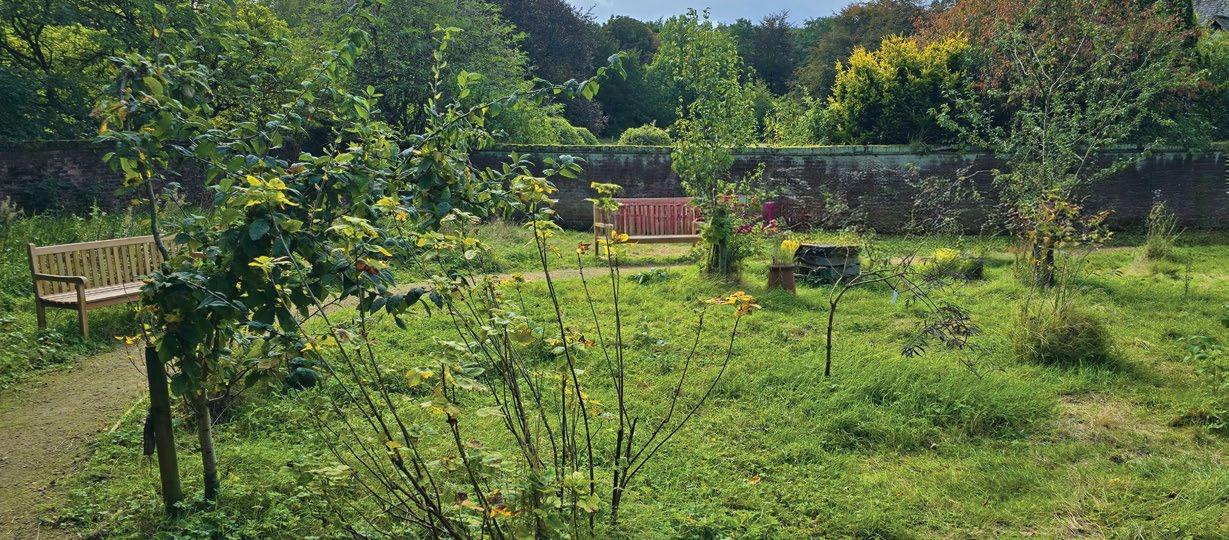
Ten years ago, Pope Francis’ encyclical Laudato Si’: On Care for Our Common Home echoed across the United Kingdom and around the world. It offered an invitation to reflect on our relationship with God’s creation and was a call to not only think differently but to live differently. That message has taken root here in the U.K, shaping a decade of ecological awareness, action, and collaboration.
Eco parishes and community gardens are slowly emerging, offering a sense of connection with the land. Projects to reduce waste, share resources, and live more lightly on the earth are becoming part of parish life. Over 4,500 Catholic churches and schools are now powered by renewable gas and electricity through the energy procurement company InterDiocesan Fuel Management Ltd. This is one sign of how faith communities are making practical choices for a better future.
The Catholic Agency for Overseas Development’s (CAFOD) LiveSimply initiative has given structure and encouragement to this movement, helping communities live in ways that are simple, sustainable, and in solidarity with the poor. The framework invites us to consider what it means to live responsibly today. More than 100 schools have achieved the LiveSimply award, with over 30,000 young people involved. Young people are beginning to see their place in the world differently. In schools, our students are starting to form eco groups and encourage their communities to live differently. They are not only responding to Laudato Si’ they are taking it forward.
A growing network of Laudato Si’ Animators has emerged to support and encourage this journey. In parishes and dioceses, they offer a voice, helping others to deepen their ecological spirituality, adopt more sustainable practices, and speak out for climate
justice. This reminds us that change often begins with small acts, shared stories, and the encouragement of a community walking the same path.
One of the most significant contributions of Laudato Si’ has been how it has reframed our understanding of environmental care. Previously, ecological concern was often seen as a matter of personal choice. Pope Francis helped us see it instead as a question of justice. The damage done to the earth is not shared equally. It falls most heavily on the poor and vulnerable. To care for creation is not simply to be kind. It is to be just. It is to ensure that all people, now and in the future, can live in dignity within a healthy environment.
The concept of integral ecology, recognising that environmental, social, economic, and spiritual well-being are interconnected, has become more prominent in how many communities in the U.K. reflect and act. The phrases “the cry of the earth and the cry of the poor” is influencing our faith and choices, calling us to hear both as one and the same cry. This growing awareness has started conversations about fossil fuel divestment and climate finance. By 2025, 12 of 22 Catholic dioceses in England and Wales and all eight Scottish dioceses had divested from fossil fuels. Religious orders and Catholic leaders, including Bishop John Arnold, have also called for polluter taxes to fund global climate finance.
The impact of Laudato Si’ has extended beyond the Catholic Church. Its universal themes, moral clarity and compassion, have echoed with many Christian denominations who have responded in ways ranging from formal endorsements of Laudato Si’ to practical actions rooted in shared values.
In my local interfaith group, the encyclical has also sparked meaningful engagement among non-
Christian faith communities. Jewish, Muslim, and Sikh groups in the U.K. have found that its message echoes their own teachings on stewardship and care for creation. Laudato Si’ offers a framework where different faiths can share values and build bridges, fostering a deeper sense of shared purpose across religious traditions.
One of the clearest physical responses to Laudato Si’ can be found at Wardley Hall in the Diocese of Salford. There, the Laudato Si’ Centre welcomes people to explore practical responses to climate change. Since 2019, over 3,000 visitors, such as schoolchildren, parish groups, and community organisations, have gone to learn, reflect, and experience a vision of integral ecology brought to life.
Laudato Si’ has made a lasting contribution to the way we talk about the environment in the U.K. It has introduced language, like “ecological conversion” and “integral ecology,” that connects care for the earth with deeper ethical and spiritual questions. These terms have enriched our vocabulary, allowing us to speak more clearly and more compassionately about what is at stake. They remind us that this is not just about environmentalism; it is about the kind of people we are becoming, and the kind of world we are shaping for those who come after us.
As we mark this ten-year milestone, we are invited not only to look back with gratitude but to look forward with intention. Laudato Si’ offers us more than a roadmap; it offers a vision rooted in justice, community, and hope. It is a call to see differently, live differently, and walk more gently on the earth. Here in the U.K. and beyond, the journey is not over. What more might each of us do, within our communities and within ourselves, to care for our common home?

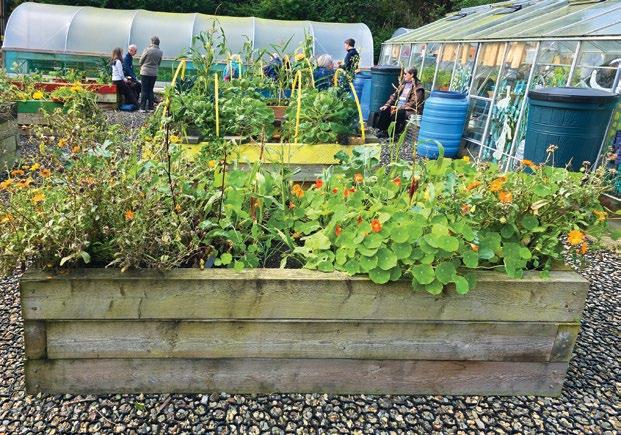
“This is not just about environmentalism; it is about the kind of people we are becoming, and the kind of world we are shaping for those who come after us.”
All photos taken at the Laudato Si’ Centre at Wardley Hall, Manchester, United Kingdom
Reading the Signs of the Times Who We Are, Who We Have Always Been
By Kelly Marsicano, Communications Coordinator
The Constitutions of the Sisters of St. Joseph of Peace state: “In facing the challenges of our times and uniting with the church’s concerns for peace, we respond with flexibility required by changing needs and remain open to engaging in new forms of ministry.” (Constitution 27)
Each of the five ministries sponsored by the Congregation and Peace Ministries was born out of the needs of the time. Whether they were founded 25 years ago or 125 years ago, the ministries continue to be responsive to the needs of the communities they serve, while holding on to the values on which they were founded.
St. Joseph’s School for the Blind, our oldest ministry, was founded in 1891 to provide critical services to individuals who are blind in New Jersey. In the 1960s, guided by one of the core values of the sisters— Reading the Signs of the Times—the school began welcoming students with disabilities in addition to visual impairments. And this school year, St. Joseph’s began accepting students with a range of disabilities, regardless of vision impairment.
“During the past few years, we have seen an increase in requests for information about our school program from parents of children with medical conditions, multiple disabilities and disabilities other than visual impairments,” says David Feinhals, executive director. “In our adherence to our core value of Reading the Signs of the Times, we decided to allow these students to enroll as long as we believed that we could meet all of their academic, therapeutic, psychological and social needs.”
As Holy Name celebrates its 100th anniversary this year, the healthcare system continues to evolve
while staying true to its values. “Our foundation was laid by the Sisters of St. Joseph of Peace, who saw healthcare not merely as a service but as a sacred trust. We remain deeply rooted in those values; providing dignity, compassion and unwavering commitment to the evolving needs of the communities we serve,” says CEO and President Mike Maron. “As we honor that past, we also build toward a future of innovation and growth.”
In October of last year, the hospital opened a new state-of-the-art, Level III Neonatal Intensive Care Unit. Holy Name is also one of only two hospitals in New Jersey to utilize cutting-edge cardiac imaging technology: photon-counting CT or PCCT. This next-generation CT scanner provides more detailed images of the heart, exposing patients to less radiation while enabling doctors to more confidently detect life-threatening issues and provide faster, more accurate diagnoses. Additionally, the hospital has recently focused on establishing its Graduate Medical Education program. The teaching program was accredited in early 2024 and has been separately accredited for General Surgery, Internal Medicine, and Family Medicine with other specialties to follow. Residency training began in June. The program will allow Holy Name to improve quality, programs and services in a highly competitive environment and train top physicians who are grounded in the mission and core values. “‘Great Medicine. Soul Purpose.’ isn’t just a tagline,” Maron adds. “It’s embedded in the DNA of each individual who works here and drives us to deliver cutting-edge care while remaining true to the mission that has defined us for generations.”
Meanwhile, as the healthcare industry continues to feel the effects of the pandemic, from workforce
continued on page 20


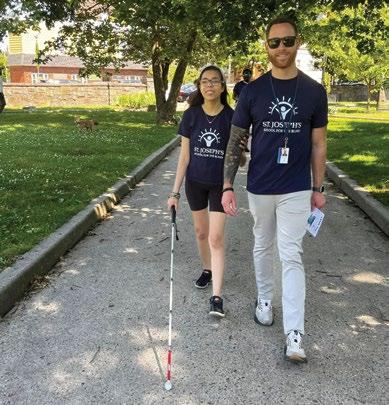
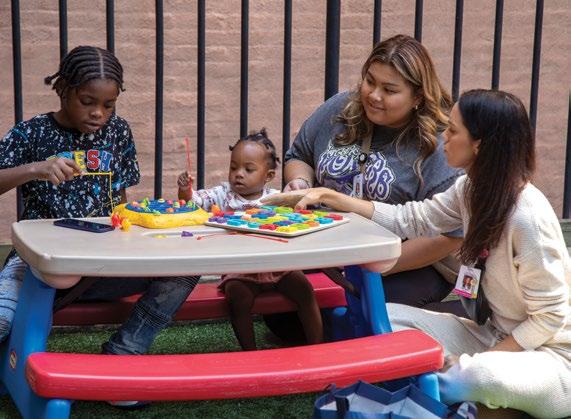

Clockwise from top: Ribbon cutting for Neonatal Intensive Care unit at Holy Name, Health Fair at York Street Project, Waterspirit joins other advocates for climate justice, St. Joseph School for the Blind Walk-a-Thon, Peace Care staff.
Reading the Signs of the Times, continued from page 18
shortages to occupancy rates, Peace Care is reading the signs of these times and assessing its current services. “Our newly developed strategic plan focuses on creating a sustainable future for Peace Care by building upon our strong mission foundation,” says Chief Executive Officer Kyle Hreben. “Through this work, we’re prioritizing new service lines to meet the evolving needs of older adults in our community, including expanding memory care programming and strengthening partnerships to enhance rehabilitation services.”
Peace Care’s two centers—St. Ann’s and St. Joseph’s—remain the only Catholic short-term rehabilitation and long-term skilled nursing facilities in Hudson County.
“We are also focused on ensuring financial stewardship, investing in our team, and deepening the ways we live out our core values each day,” Hreben adds.
Over at York Street Project, the organization has been helping homeless and economically disadvantaged women and children break the cycle of poverty and enter a life of self-sufficiency for the past 35 years. It achieves this by using programs designed to address the basic needs of housing, education and childcare. “We continue to evaluate the services we’re providing. We make sure we’re using best practices. We assess all our families every quarter, update service plans monthly and adjust the services as needed,” says Executive Director Sue Byrne. “We take a holistic approach to supporting our families.”
That includes hiring more case managers, offering mental health support, working on tasks of daily living, and bringing in an employment training specialist. The goal is to provide families with all they need to remain stably housed after leaving York Street Project.
Byrne, who has been with the organization for more than 25 years, says the needs of families today are different from when she first started, particularly in the areas of addiction, increased domestic violence, and mental health issues. She also says income has not kept up with the cost of housing. “Affordable housing is not an unsolvable problem,” Byrne states. “This is not a crisis that doesn’t have a solution, it just needs the political will and funding.” She remains a strong advocate for affordable housing in New Jersey and serves on the board of the Coalition to End Homelessness.
“We are also focused on ensuring financial stewardship, investing in our team, and deepening the ways we live out our core values each day.” – Kyle Hreben
environmental injustice through a spiritually-informed lens. With the Earth continuing to face threats of extreme weather events, rising sea levels and impacts on water resources, Waterspirit has created a variety of programming to help better inform the public and inspire others to become advocates. “Waterspirit has a long history of reading the signs of the times and adjusting our activities to meet the demands of the moment while holding true to our core values of caring for creation and protecting water,” says Blair Nelsen, executive director.
Waterspirit also collaborates closely with environmental organizations throughout the state to mobilize its advocacy volunteers around up-to-theminute water and climate issues. It has embraced new technologies to facilitate those actions. Last year, it launched an online Waterspirit Ambassador training course, equipping volunteers to get involved throughout the year.
In addition, the organization began an eco-anxiety support group, which helps participants “find comfort, hope and resilience amidst the impacts of the climate crisis,” Nelsen says. “We embraced a 10step eco-anxiety support group model in 2019, which moved online in 2020 and expanded into an array of climate distress offerings, including the online Climate Pastoral Care Course and standalone Climate Cafes.”
It is evident that our ministries navigate these new times with discernment and openness to respond as needs change while remaining committed to their work, their mission and their values. And that’s not going to change. This is who we are. It’s who we have always been.
Waterspirit, our youngest ministry, started in 1998, is dedicated to acting on climate change issues and

Kenmare Press
There are now six books available under the Kenmare Press imprint in both paperback and eBook format. Find Kenmare Press on our website: https://bit.ly/kenmarepress.
Peace Pays a Price by Dorothy Vidulich, CSJP
The Sparrow Finds Her Home: A Journey to Find the True Self by Doris J. Mical, CSJP
Traveling Empty – Poems by Susan Dewitt, CSJP
My Friend Joe: Reflections on St. Joseph by Susan Rose Francois, CSJP
Images of Refuge by Margaret Jane Kling, CSJP
Beyond all Galaxies: Poetry and Reflections for the Journey by Kathleen Pruitt, CSJP
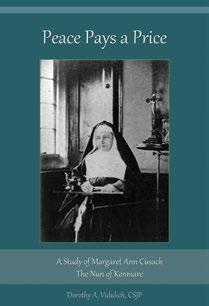
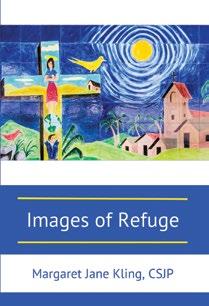
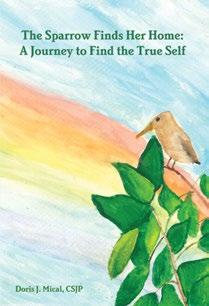

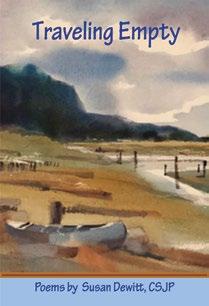
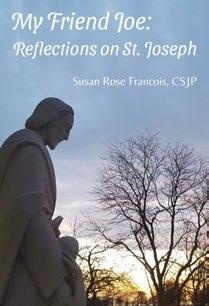
Kenmare Press is an imprint of the Sisters of St. Joseph of Peace and carries on the Congregation’s long tradition of writing and publishing. Our founder, Margaret Anna Cusack (Mother Francis Clare), was a prolific writer, most often publishing as M.F. Cusack or Mary Francis Cusack. By 1870, more than 200,000 copies of her works had circulated throughout the world. Profits from the sale of her books were used for the sisters’ work with the poor. Today, many of her books are in the public domain and available to read or download online.
Who are you listening to?
by Stephanie Peirolo, CSJP-A
My granddaughter just turned six, and we’ve been talking about what a conscience is. I defaulted to the cartoon image I grew up with – a small angel on one shoulder and a diminutive devil on the other. They argue with you, and you have to decide who you are going to listen to when you make your choices. I do not pretend, even to a child, that the devil is not an excellent persuader.
As an adult, I find that the entities on my proverbial shoulders are more varied and skilled. Some members of my Inner Community are very persuasive. Justification shows up in a three-piece suit and heady arguments, Greed in work clothes with a wheelbarrow full of fear, a languid Sloth on a lounge chair wondering why we must trouble ourselves with anything beyond comfort. In my Inner Community there are a few who are very good at disconnecting me from my moral and ethical compass.
I find this verse from Romans to be useful. “Do not conform to the pattern of this world, but be transformed by the renewing of your mind. Then you will be able to test and approve what God’s will is—his good, pleasing and perfect will.” Romans 12:2 (NIV)
How do I conform to the pattern of this world? I order things I don’t really need from Amazon, a company I know treats their employees badly. Some of the things I buy will end up in a landfill. I don’t look at the ways in which my participation in late-stage capitalism as a worker and consumer has warped my sense of what I need. Fear of future financial insecurity makes me work too hard and not rest enough. I benefit from white privilege but don’t always want to accept responsibility for that privilege or what it has cost others. The pattern of this world is grasp, gripe, condemn and judge, and I round those bases regularly.
Be transformed by the renewing of your mind. How? Be curious. Engage with new ideas, new people, different cultures. You are reading this in an effort to renew your mind. Being in community renews our
minds. It is a beautiful warm day today and I open the window and the whole atmosphere in my office changes. A breeze carries in fresh scents of cut grass and the sounds of birds. Renewing our minds is opening up the window of our souls. It means being willing to let go of ideas and narratives that no longer serve us, which can be hard. Sometimes we need to mourn the loss of old ideas.
How can we then “test and approve” God’s will?
Another translation here is “discern.” St. Ignatius
“Renewing our minds is opening up the window of our souls.”
of Loyola developed the Spiritual Exercises as an instruction manual for discernment. One of the exercises is called “The Two Standards” with standards meaning flags or banners used in battle. Ignatius was a mercenary before he was a priest, after all. He tells us to pick a side. Are you fighting on the side of Jesus or the Devil? Who are you riding with?
At first, most of us will think, of course, Team Jesus, that’s me. But is it? You can’t conform to the world’s patterns and be on Team Jesus. You can’t be a Christian and have unquestioning support of an administration that defunds and ends programs to feed, protect and heal children and the elderly. It is never as easy as choosing between two starkly different options – red flag bad, green flag good.
C.S. Lewis often reminds us that we are eternal beings, and that small choices now can have longterm consequences when you extend the trajectory throughout eternity.
Every time you make a choice you are turning the
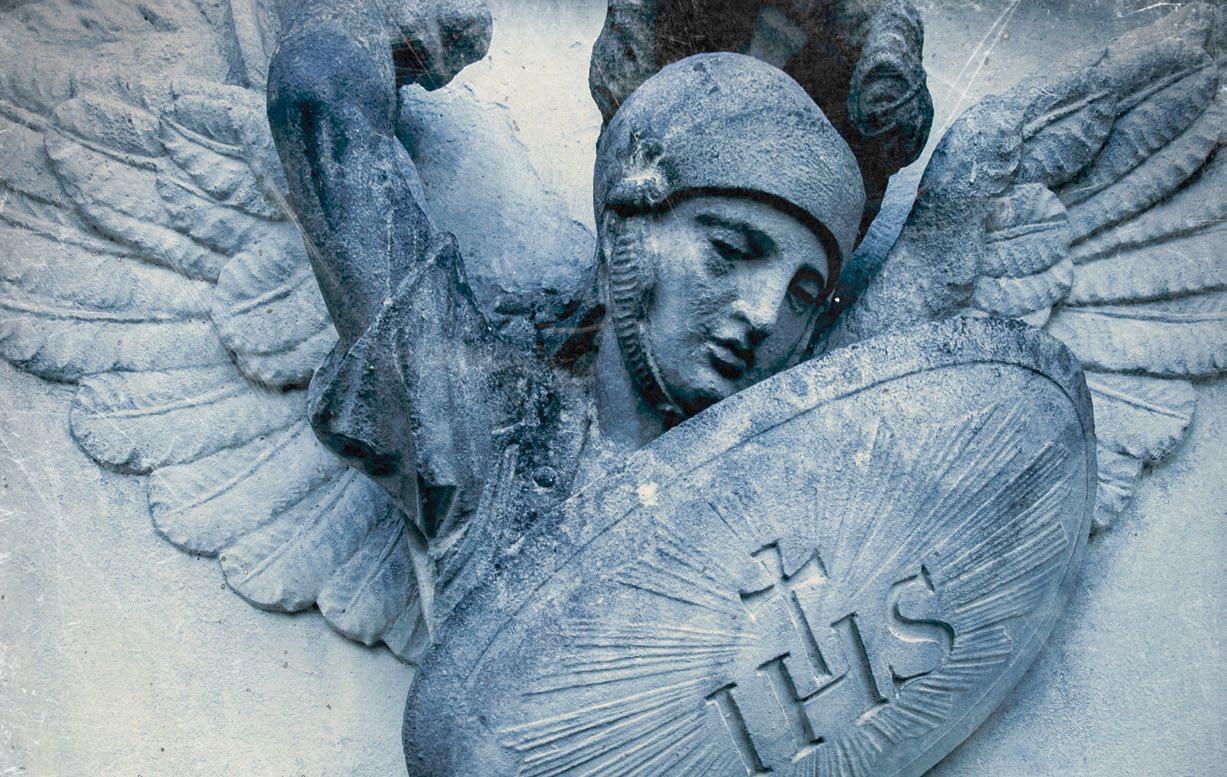
central part of you, the part of you that chooses, into something a little different from what it was before. And taking your life as a whole, with all your innumerable choices, all your life long you are slowly turning this central thing either into a heavenly creature or into a hellish creature.1
In his book The Great Divorce, Lewis imagines that we choose whether we want to go to Heaven or Hell. Hell is easier, and many choose that destination. And the choices are ongoing, throughout our lives. Each decision we make sharpens or dulls our ability to discern. The more we test and approve, the better we get at it.
Remember that, as I said, the right direction leads not only to peace but to knowledge. When a man is getting better he understands more and more clearly the evil that is still left in him. When a man is getting worse, he understands his own badness less and less. A moderately bad man knows he is not very good: a thoroughly bad man thinks he is all right.2
I am in no way suggesting that we judge ourselves harshly. We should consider our own moral and spiritual progress with compassion and kindness. But if you, like me, find yourself thinking “I’m not as bad as that guy,” then recognize that the pattern of this world is shifting. The Overton window is a reference
to what, as a society, we consider to be acceptable. What was once radical or unsupportable can become accepted wisdom, unremarkable, and the reverse is true. The Overton window is shifting dramatically in the United States. Political and policy decisions are being made that would have been unimaginable a few years ago. If we, as individuals, community and culture, do not keep up with our own discernment process, if we don’t continue to be open to new ideas and information that challenges us, if we don’t identify and sort out who in our Internal Community we want to listen to and who no longer gets to be in charge, we risk finding ourselves, after a series of small, seemingly innocuous decisions, on the wrong side.
Stephanie is a CSJP associate and writer. Her new book, The Saint and the Drunk: A Guide to Making the Big Decisions in Your Life, examines Ignatian Discernment through the lens of the 12-Step Higher Power. More at speirolo.com
ENDNOTES
1 “Mere Christianity” by C. S. Lewis, Book III, Chapter 4, “Morality and Psychoanalysis”, 1952.
2 Ibid.
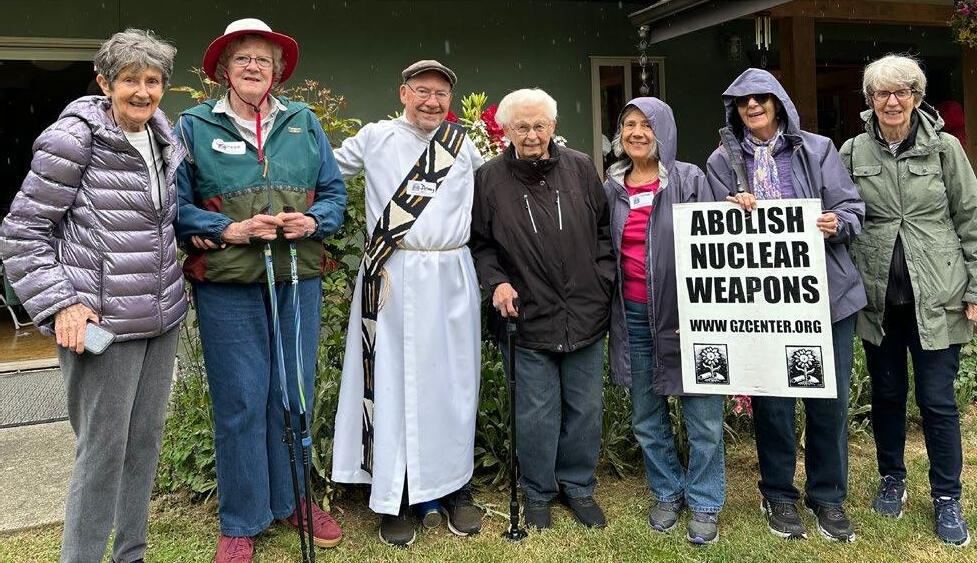
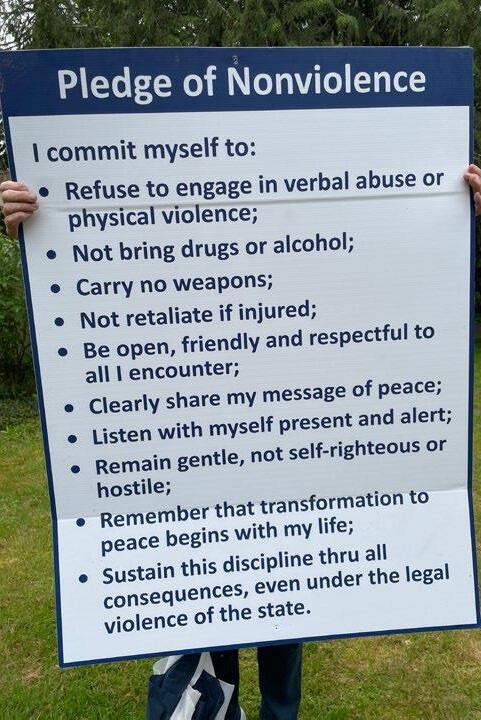
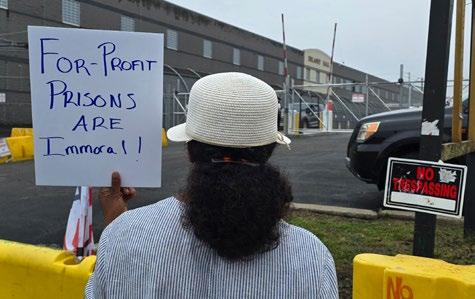
“In accord with our tradition we commit ourselves to promote peace in family life, in the church, and in society. We strive to respect the dignity of all persons, to value the gifts of creation, and to confront oppressive situations. We respond to God’s people in need and promote social justice as a way to peace.” (Constitution 11)
In addition to their own commitment to prayer and justice advocacy, the Sisters and Associates of St. Joseph of Peace have a long history of standing in solidarity with those who organize nonviolent actions, prayer vigils, and demonstrations.
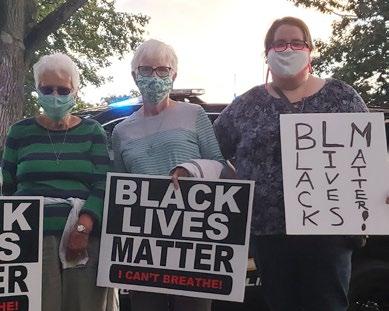
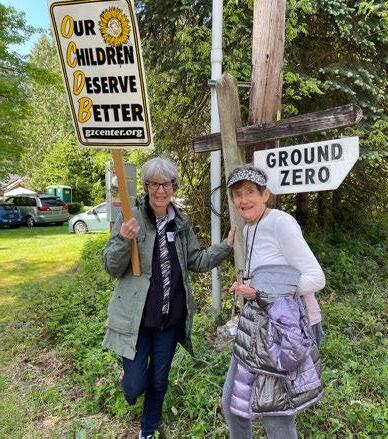
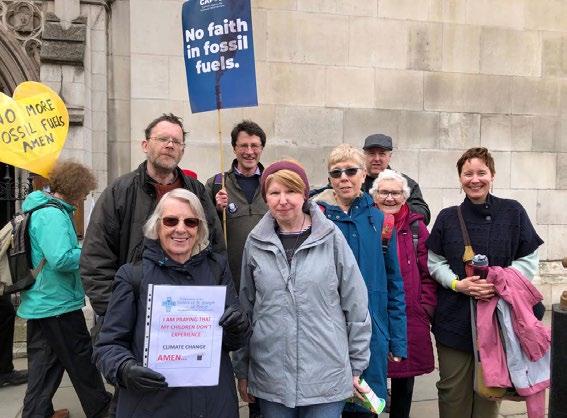
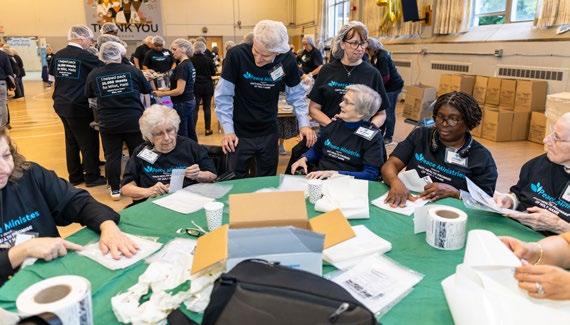
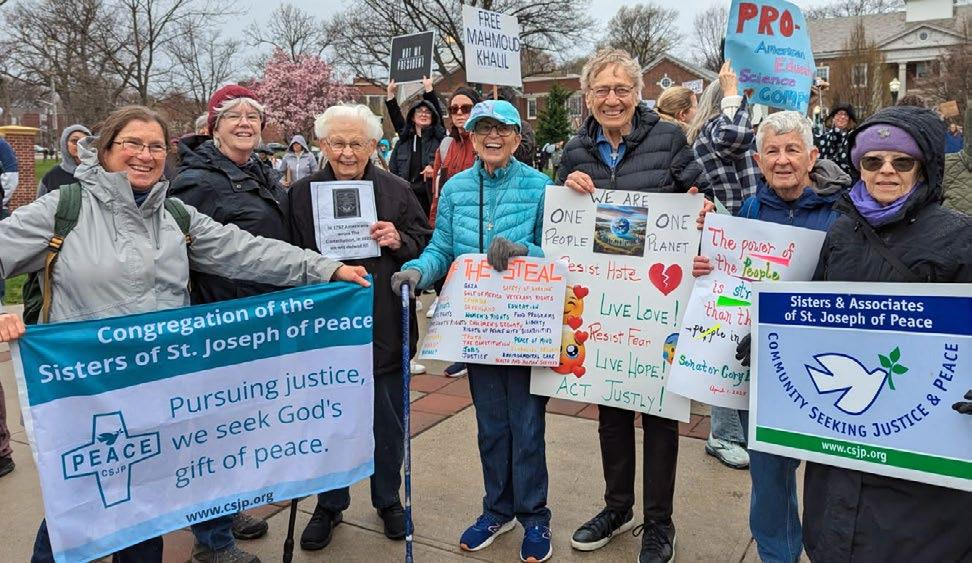
History&Roots Peace and Justice Amid Revolutionary Change
By Susan Rose Francois, CSJP
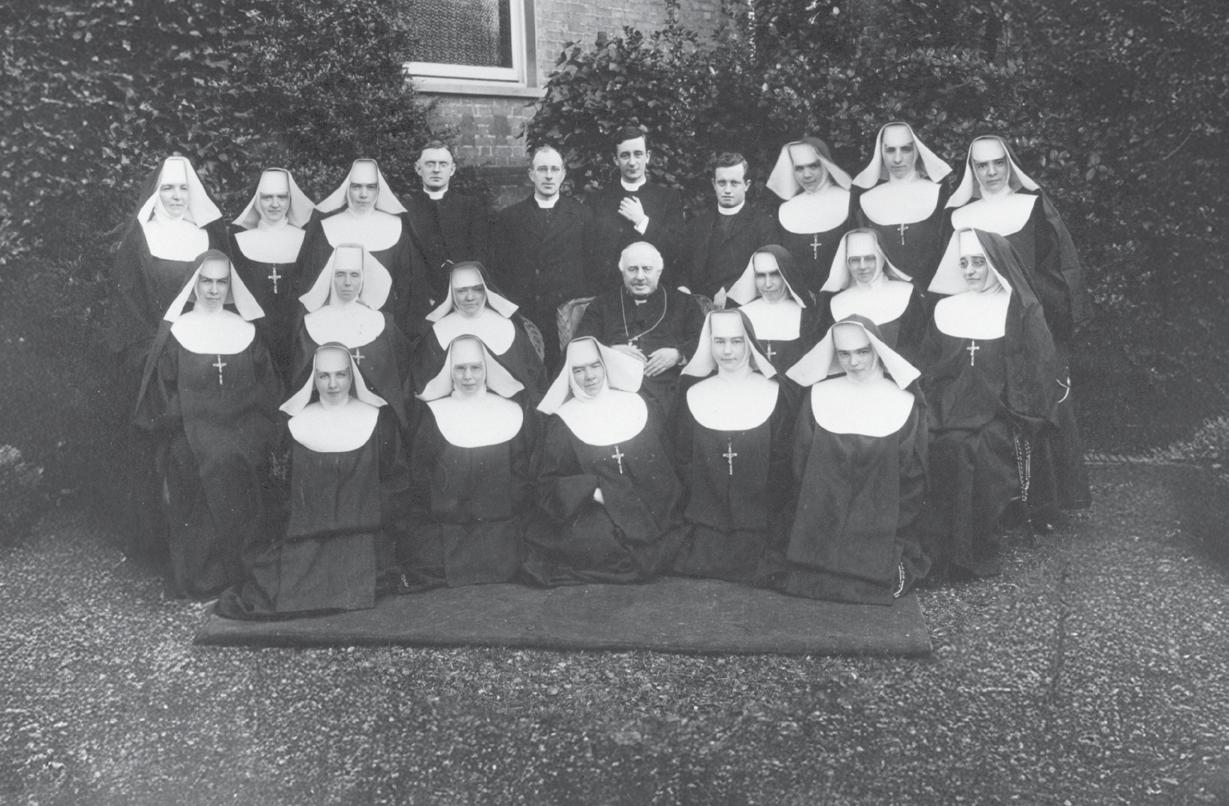
When Bishop Edward Gilpin Bagshawe welcomed the Sisters of St. Joseph of Peace to the Diocese of Nottingham in 1884, he found in Mother Francis Clare and her companions courageous women who would promote peace through acts of mercy and justice to the poor. The next year, in fact, he published a compilation of pastoral letters on political economy titled just that, Mercy and Justice to the Poor
“There can be no doubt,” Bishop Bagshawe wrote in this social teaching document, “that in many of the received usages of business and modes of making money prevalent in modern times, by which such enormous fortunes are accumulated in the hands of a few, while the multitudes are ever more and more impoverished, there is very much which is contrary to justice no less than to mercy.”
Bishop Bagshawe’s concerns about the negative impacts on the many of the accumulation of wealth by the few continued to be a major focus of his ministry and writing. In his 1888 pastoral letter for Advent, he wrote: “We Catholics in England find ourselves in this country in the presence of an
enormous mass of poverty and pauperism, existing side by side with almost incredibly great wealth, possessed by those who are comparatively few in numbers. And the destitution of the poor is so extreme that it is true to say that millions among us live in abject misery and degradation, while millions more have the greatest difficulty in procuring the necessaries of life.”
He called on the people of his Diocese to see this disturbing reality through the eyes of faith, and to develop “a greater mutual charity among ourselves, and a greater love and reverence for Christ’s poor.”
He offered a wide range of actions they might consider, from visiting the sick to registering voters.
No doubt, Bishop Bagshawe was delighted when Pope Leo XIII brought the light of the Gospel, and the weight of magisterial teaching, to these same economic forces and their harmful impacts. In May 1891, Pope Leo XIII wrote what is now considered the foundational document of modern Catholic Social Teaching, Rerum Novarum, which translates from the Latin to “of new things” or “of revolutionary change.”
St. Mary’s Convent, Hanwell, 1913 – Mother Evangelista and Bishop Bagshawe in the center on the occasion of Sister St. John’s silver Jubilee.
“That the spirit of revolutionary change,” Pope Leo XIII wrote, “which has long been disturbing the nations of the world, should have passed beyond the sphere of politics and made its influence felt in the cognate sphere of practical economics is not surprising.” The Pope not only named the same dehumanizing conditions facing working people that Bagshawe highlighted, he also affirmed the rights of workers to just wages, rest, to form unions, and to strike if necessary. Decades before the Church articulated a preferential option for the poor, Pope Leo XIII recognized that while the wealthy “have many ways of shielding themselves … the mass of the poor have no resources of their own to fall back upon … And it is for this reason that wage-earners, since they mostly belong in the mass of the needy, should be specially cared for and protected by the government.”
Bishop Bagshawe devoted his 1891 Advent Pastoral Letter to what The Tablet called “the Papal Encyclical on Strikes” – Rerum Novarum. “A workman is God’s creature, made in the image and likeness of God. No one may lawfully refuse to respect his great dignity,” wrote the Bishop. “The wicked and oppressive practices which, since the Reformation, have pauperized and demoralized vast multitudes, both in Europe and America, have here, we trust, received a death blow … all struck at by the doctrine of the Pope.”
One cannot help but wonder what Bishop Bagshawe and Pope Leo XIII would make of the revolutionary changes currently taking place today, as we enter the second quarter of the 21st Century. The first actions of the new Pope, however, point to one possibility. By choosing the name Pope Leo XIV, the Holy Father made it clear that we are presently in the midst of another revolutionary era in desperate need of reflection and action in the light of the Gospel.
In his address to the College of Cardinals on his first full day in office, he noted that “Pope Leo XIII in his historic Encyclical Rerum Novarum addressed the social question in the context of the first great industrial revolution. In our own day, the Church offers to everyone the treasury of her social teaching in response to another industrial revolution and to developments in the field of artificial intelligence that pose new challenges for the defense of human dignity, justice, and labour.”
We
invite you to connect & participate
Consider becoming a Sister
In the USA contact: Sister Chero Chuma, CSJP, U.S. Vocation Director, cherochuma@csjp.org
In the UK, contact: Sister Maureen Brennan, CSJP, UK Vocation Director, maureenbrennancsjp@gmail.com
Consider becoming an associate Women or men who share our concerns and charism, visit: https://csjp.org/join-us
request prayer Support
Do not be anxious about anything, but in everything, by prayer and supplication, with thanksgiving, let your requests be made known to God.
—Philippians 4:6
Our sisters and associates pray daily for friends, supporters, all who ask our prayers and those linked with us through the Pious Union of Prayer. The original purpose of this Union was to form a network of prayer for peace in homes and in families. Send a request online by selecting “Prayer Request” from our website home page menu, www.csjp.org or by mail in the U.S. using the return envelope.
Subscriptions/Feedback
We invite you to subscribe to Living Peace at no cost. Subscribe online by selecting About Us/ Publications and Media from our website homepage menu.
Sisters of St. Joseph of Peace
Congregation Office
399 Hudson Terrace
Englewood Cliffs, NJ 07632
Pursuing justice, we seek God’s gift of peace.
It is time to be who we have always said we are. It is time to live our words. We embrace these promptings of the Spirit with courage, humility, hope and trust.
(Extracted from the Sisters of St. Joseph of Peace 2023 Chapter Call – To Be Who We Say We Are)
